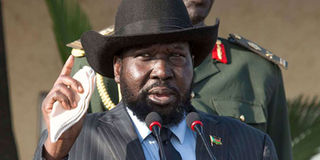Landmark case against S. Sudan for sexual violence against women, girls

South Sudan's President Salva Kiir speaks to the press upon his arrival in the capital Juba on August 6, 2018, following the signing in Sudan of a ceasefire and power sharing agreement. When confronted with facts on the use of rape as a weapon of war, the government always denies. PHOTO | AKUOT CHOL | AFP
What you need to know:
- The South Sudan judicial system is almost non-existent. The Executive and the military are known to exert influence over the Judiciary.
- Despite the peace deal, South Sudan cannot meaningfully move forward without holding perpetrators of these heinous violations to account
When South Sudan became independent in 2011, many hoped it would be a new dawn, characterised by peace and stability after years of war.
Sadly, it was not to be. Armed conflict erupted in December 2013. Forces aligned to President Salva Kiir and former vice president Riek Machar took up arms against one another.
Tens of thousands of women and girls have been subjected to sexual violence by government forces. Unfortunately, almost no one has been held to account.
Last week, Legal Action Worldwide filed a case against the government at the Geneva-based Committee on the Elimination of Discrimination Against Women (CEDAW) on behalf of 30 women and girls.
The complaint outlines brutality, including sexual slavery and torture and rape by army officers and the presidential guard during raids, and while victims fled between June 2016 to September 2017.
Sophia — not her real name — told of how she was raped by two soldiers, in the presence of her children, until she slipped out of consciousness.
“When I regained consciousness…my abdomen was painful. The soldiers had left. My children said the soldiers threatened to kill them if they cried,” she said.
ORDEAL
Like many survivors, Sophia fled. As she walked in the bush with other civilians fleeing the conflict a week later, a different group of armed men attacked the group and raped the women as children watched.
Sophia was again raped by two men. “I almost lose my mind when I think of what happened,” she said.
Sophia’s experience is just one of thousands of South Sudanese women and girls. Many survivors described how government-aligned soldiers laughed, mocked and spat on them.
Alice said she was raped by three soldiers who broke into her house at night looking for her husband.
“They said they were there to punish him for joining the rebels...one said if I continued screaming, he would kill me. The three men …raped me,” she said.
The South Sudan judicial system is almost non-existent. The Executive and the military are known to exert influence over the Judiciary.
FEAR
Many survivors do not report sexual violence, mainly because of fear of reprisals.
However, the 30 that Legal Action Worldwide represents in the case, want to speak about what they went through.
Their statements show a consistent pattern of rape, gang rape and sexual slavery, perpetrated in most cases by the government or government-aligned forces.
Many survivors told of endless suffering from the effects of physical injuries, gynaecological complications, sexually transmitted diseases, depression and trauma, spousal desertion, isolation and stigma.
When confronted with facts on the use of rape as a weapon of war, the government always denies.
It is therefore not surprising that the first reaction by the Government of South Sudan was to deny the reports of the rape of more than 150 women and girls in Bentiu region just a week ago, despite confirmation by Médecins Sans Frontières that survivors sought treatment at its clinic.
JUSTICE
With regards to the case filed at the CEDAW Committee, the government immediately denied and accused the parties of having ulterior motives against the peace process.
Despite lack of commitment by the government to address these crimes, survivors refuse to remain silent.
They want the government to be held accountable for failure to prevent and to protect women and girls from sexual violence.
Their message is clear: Despite the peace deal, South Sudan cannot meaningfully move forward without holding perpetrators of these heinous violations to account.
The writer is the Executive Director of Legal Action Worldwide.




